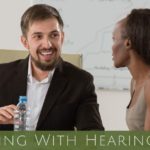Over the years, technology around hearing healthcare and hearing aids themselves have improved tremendously. However, there is still a lot of stigma and misinformation surrounding hearing loss. Sorting through truth and myth can elucidate and better inform people, and their loved ones, about hearing loss in a vast sea of uncertainty.
Myth #1: Not very many people are affected by hearing loss
Fact: In the United States, about 48 million people suffer from hearing loss (about 20% of the population) and about 40 percent of them are younger than 60. Globally, it is estimated that 466 million people have disabling hearing loss and 34 million of them are children.
According to the World Health Organization (WHO), hearing loss may result from genetic causes, complications at birth, certain infectious diseases, chronic ear infections, the use of particular drugs, exposure to excessive noise, and aging. Few of these are specific to a particular age group so this medical condition affects multiple populations
Myth #2: All people with hearing loss use hearing aids
Fact: Hearing aids can be helpful tools to improve hearing for people with hearing loss, but not everyone uses them. Hearing loss can happen over a long period of time and can go unnoticed for years, often with a close friend or relative beginning to ask questions and suggest taking a hearing test. The period from diagnosis to obtaining a hearing aid can be a journey that takes upwards of seven years.
In the meantime, people with different levels of hearing loss are making accommodations for themselves and their environments to communicate effectively. Many use lip-reading and body language to their advantage while others may socialize in quieter places.
Myth #3: Loud concerts of your youth are to blame for your hearing loss
Fact: Although loud live events are not the best for your hearing, there are more contributing factors to hearing loss than screeching guitars and thunderous drums. The WHO separates the causes of hearing loss and deafness into two categories: congenital and acquired. Congenital, acquired at or soon after birth, is a rarity caused by low birth weight, maternal infections during pregnancy, and others.
The second category is referred to as acquired, which may lead to hearing loss at any age. They include: diseases including measles, mumps, and rubella; chronic ear infections; collection of fluid in the ear; excessive noises, including occupational noise such as that from machinery and explosions; recreational exposure to loud sounds with ear protection, and more.
Myth #4: Hearing loss makes telephones too hard to use
Fact: The advancement of technology we use every day integrates hearing aids and assistive hearing devices more than ever. Bluetooth technology now connects directly to some hearing aid models, like the Phonak Audeo Marvel series to allow you to use cellular phones more easily. A captioned telephone company called CapTel has a line of phones where the user can read a captioned version of their conversation while speaking on the phone.
Myth #5: Hearing loss is unfortunate, but it does not affect my health
Fact: Hearing loss can affect other areas of your health if left unchecked. A Johns Hopkins study tracked 639 adults for 12 years and found that mild hearing loss doubled dementia risk, moderate loss tripled risk, and people with a severe hearing impairment were five times more likely to develop dementia.
Frank Lin, M.D., Ph. D, says, “Brain scans show us that hearing loss may contribute to a faster rate of atrophy in the brain. Hearing loss also contributes to social isolation. You may not want to be with people as much, and when you are you may not engage in conversation as much. These factors may contribute to dementia.”
Facts Are Facts
As you find your way to the truth within the wealth of information regarding hearing health, remember that a great resource is always your doctor or hearing healthcare provider. If ever you want to cross check your sources, you can find an audiologist (a doctor of audiology who evaluates, treats, and manages hearing loss and related conditions) or BC-HIS (a technician Board Certified in Hearing Instrument Sciences) online to ask questions and schedule an appointment. Remember that misguided perceptions and misinformation lead to the perpetuation of myths about hearing loss. Break the cycle and educate yourself!






